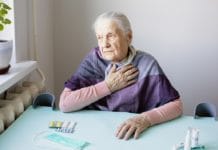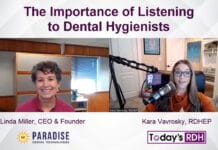It’s no secret that dental hygienists can become mentally and physically exhausted due to back, shoulder, and neck pain. However, what is a lesser-known fact is a particularly unique and fun way hygienists can help avoid this full-body burnout. While there is no quick and easy answer for hygienists to keep their working muscles flexible, healthy, and strong, many activities can provide gradual steps to accomplishing this. One effective, enjoyable method that may be surprising to hygienists is rock climbing.
Benefits of Rock Climbing
As a sport, rock climbing can help with the following aspects of a hygienist’s physical body:
- Muscular endurance and strength: By nature, rock climbing requires sustained isometric muscle contraction and strength in the upper body, which helps provide upward Dental hygienists often hold the opposite position, contracting their body inwardly and in a downward movement.1
- Postural muscles and range of motion: Dental hygienists often keep the same position for extended periods. Developing these postural muscles is crucial in order to prevent fatigue-related injuries. Rock climbing can help strengthen those exact postural muscles in the back and neck.2 Climbing also requires a wide range of motion in the shoulders and neck, which helps improve flexibility and joint mobility.
- Injury prevention: Any physical therapist or chiropractor will tell you that strengthening the muscles is key to preventing injury in the future from poor posture and overuse. Rock climbing provides a built-in strengthening routine to target those muscles surrounding the areas performing repetitive tasks, which is a crucial part of preventing work-related musculoskeletal disorders.
Aside from the various physical benefits of rock climbing, this particular hobby can actually provide a wide range of mental and emotional benefits as well, including:
- Stress reduction: Performing physical exercise, such as climbing, typically stimulates the release of endorphins and neurotransmitters like dopamine and serotonin, significantly boosting one’s mood and helping to lower stress.3
- Improved cognitive function and depression symptoms: As a sport, climbing requires unique problem-solving skills and concentration, which have been known to enhance cognitive function. Rock climbing has also been shown to lower depression levels in individuals.4
- Enhanced self-efficacy and human connection: Hygienists may have days when they feel like they struggle with confidence or skill level. Rock climbing comes with a certain thrill when reaching the top – one can know that they pushed themselves to an impressive limit and spent time with others chasing the same goal.5
- Mindfulness and flow state: A flow state is “a mental state in which a person is completely focused on a single task or activity. They are directing all of their attention toward the task, and they do not experience many thoughts about themselves or their performance.”6 Informally, this can be referred to as being “in the zone.”6 This is something that hygienists can sometimes achieve during their scaling procedures, but often, the conversation and care for patients interrupt that flow. The concentration and focus that climbing requires can help one enter a state of flow, which has been shown to have therapeutic effects, not the least of which is the reduction of anxiety.7
How to Begin
If you’re a hygienist who lives in an area without many outdoor traditional bouldering options, look no further than indoor climbing gyms. Beginning the learning process indoors is often a safer environment since one is able to potentially train with a guide and learn proper skills to avoid possible dangers. This also allows for year-round climbing options and, most likely, hours that are available before and after work hours.8
Once comfortable with indoor climbing methods and safety measures, venturing to the outdoors (if your location allows) provides a wonderful way to connect with nature and offer more challenging options.8
When looking into the various types of rock climbing, the typically three recognized categories are bouldering, top-roping, and lead climbing. Bouldering is more of a ‘basic’ choice, involving climbing shorter heights without any rope or harness assistance. Top-roping is when one climbs areas that are secured by an anchor system at the top of the wall. Finally, lead climbing is when a rope is anchored to the climber as they move, clipping the rope into place along the way.8
Whether approaching rock climbing as a novice or already established as an expert, the continuing benefits of this sport are clearly shown and recognized for all individuals, with especially beneficial advantages for hygienists.
In Closing
With the ever-increasing popularity of rock-climbing gyms in the United States, this booming hobby is becoming increasingly available to hygienists nationwide. The majority of gyms offer lessons for beginners, allowing for proper instruction and helpful information.
Dental hygienists are highly encouraged to consult their physicians, physical therapists, and/or chiropractors to learn more about the benefits of rock climbing to aid in their musculoskeletal health and to see if it is a proper fit for them.
Before you leave, check out the Today’s RDH self-study CE courses. All courses are peer-reviewed and non-sponsored to focus solely on high-quality education. Click here now.
Listen to the Today’s RDH Dental Hygiene Podcast Below:
References
- Giles, L.V., Rhodes, E.C. Taunton, J.E. The Physiology of Rock Climbing. Sports Medicine. 2006; 36(6): 529-545. https://doi.org/10.2165/00007256-200636060-00006
- O’Sullivan, P.B., Mitchell, T., Bulich, P., et al. The Relationship Between Posture and Back Muscle Endurance in Industrial Workers With Flexion-Related Low Back Pain. Manual Therapy. 2006; 11(4), 264-271. https://www.sciencedirect.com/science/article/abs/pii/S1356689X05000433
- Hall, E.E., Ekkekakis, P., Petruzzello, S.J. The Affective Beneficence of Vigorous Exercise Revisited. British Journal of Health Psychology. 2002; 7(Pt 1): 47-66. https://www.researchgate.net/publication/9026825_The_affective_beneficence_of_vigorous_exercise_revisted
- Luttenberger, K., Stelzer, E.M., Först, S., et al. Indoor Rock Climbing (Bouldering) as a New Treatment for Depression: Study Design of a Waitlist-Controlled Randomized Group Pilot Study and the First Results. BMC Psychiatry. 2015; 15(1): 201. https://www.ncbi.nlm.nih.gov/pmc/articles/PMC4548691/
- Haupt, A. (2023, February 16). Rock Climbing Is a Thrill. It’s Also Really Good for You. Time. https://time.com/6256185/rock-climbing-health-benefits/
- Villines, Z. (2022, April 19). Flow State: Definition, Examples, and How to Achieve It. Medical News Today. https://www.medicalnewstoday.com/articles/flow-state
- Csikszentmihalyi, M. (1990). Flow: The Psychology of Optimal Experience. Harper & Row.
- Wooddell, B. (2023, May 16). Climbing for Wellness: How Rock Climbing Can Improve Your Mental and Physical Health. WFLA. https://www.wfla.com/bloom-tampa-bay/climbing-for-wellness-how-rock-climbing-can-improve-your-mental-and-physical-health/











